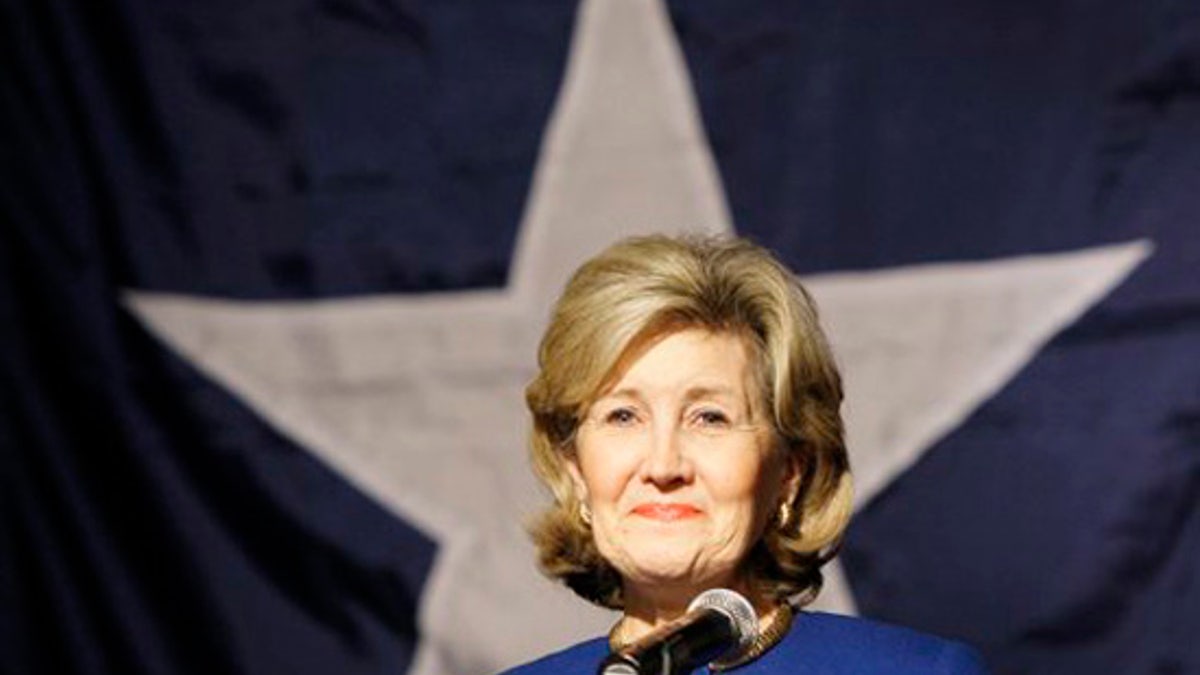
Sen. Kay Bailey Hutchison, R-Texas, smiles as supporters of her Texas gubernatorial bid cheer her after she delivers her concession speech in Dallas, Tuesday, March 2, 2010. (AP)
WASHINGTON -- U.S. Sen. Kay Bailey Hutchison's retirement announcement nearly two years before Texas voters will choose her successor gives aspiring candidates plenty of time to prepare.
The list of Republicans and Democrats who might be interested was already starting to take shape Thursday after Hutchison announced in a letter to supporters that she would not seek reelection when her term ends in 2012.
The state's first female senator has occupied her seat for nearly two decades and, observers said, many Texas politicians have been biding their time for a chance to replace her.
"This news will cause a lot of political dominoes to fall in Texas," said Mark McKinnon, a former George W. Bush political adviser and a longtime observer of Texas politics. "A lot of pols have been waiting a long time to move up."
The list is longer on the Republican side, led by popular Lt. Gov. David Dewhurst. Personally wealthy from a career in the energy industry, Dewhurst could self-fund what would be a costly statewide run, a huge advantage in a vast state.
He was deferential on Thursday, saying "today is Kay Bailey Hutchison's day." Still, he was not above stoking speculation.
"I fully intend to explore running for the United States Senate, and should I run, I will run with the intention of winning and continuing to serve the people of Texas," he said.
Other potential candidates also gingerly signaled their intention to explore the race. Railroad Commissioner Elizabeth Ames Jones offered warm praise for Hutchison before saying that, she, too, would consider the race. Other Republicans who are expected to run or consider a run are Jones' colleague on the Railroad Commission Michael Williams, Dallas Mayor Tom Leppert, and former Secretary of State Roger Williams.
The Democratic field is less clear, though national Democrats believe they can make the race competitive.
Former Houston Mayor Bill White, who like Hutchison lost a gubernatorial bid to Texas Gov. Rick Perry in 2010, has said he will not run for Senate, although Democrats may try to persuade him. Other potential candidates include former congressman and current U.S. Trade Rep. Ron Kirk and John Sharp, the state's former comptroller.
In becoming the first sitting senator to announce she won't run in 2012, Hutchison said she wanted to give Texas voters "ample time to consider who my successor will be." Whoever that is, they will be following a woman whose popularity has remained strong despite a moderate streak in a deeply conservative state and her share of setbacks in more than 30 topsy-turvy years in Texas politics.
Growing up in La Marque, Texas, Hutchison had hoped for a legal career, but after being turned down by large law firms because of her gender, she shifted first to journalism, then to banking before building a successful career in politics. After serving two terms as a state representative, Hutchison was appointed to the National Transportation Safety Board in 1976. She lost a race for the U.S. House in 1982, then left politics to work in the banking industry.
Hutchison returned to the political scene in 1990 and never looked back. After winning election as state treasurer, she parlayed her popularity into a special election victory to replace then-Sen. Lloyd Bentsen in 1993, when Bentsen left to become President Bill Clinton's treasury secretary. Hutchison was then elected to a full term in 1994 and comfortably won reelection in 2000 and 2006.
Hutchison's career took a final twist in 2010, when, after several times being mentioned as a potential candidate for governor, she decided to challenge Perry in the GOP primary. She was resoundingly defeated and thought about retiring soon afterward. Though it was difficult for her family, Hutchison said she stayed because she could not leave Texas at such a critical time.
"I intended to leave this office long before now, but I was persuaded to continue in order to avoid disadvantage to our state," Hutchison said. "The last two years have been particularly difficult, especially for my family, but I felt it would be wrong to leave the Senate during such a critical period."




















